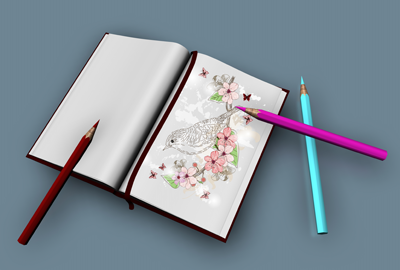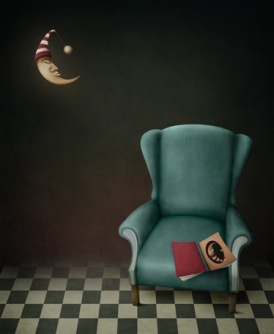Writing with Courage
Longing to Be a Writer
Once upon a time there was a girl who lived with what she thought was a terrible curse. She could not say what she meant. If she wanted the delivery boy to bring her a head of lettuce, she’d ask for a jar of peanut butter. If some big, dumb oaf insulted her and she wanted to say, “Knock it off,” she’d automatically beg his pardon instead.After many years of living this way, she came to believe the things she said, even though they were the opposite of her real meaning. She often said, for instance, that she could never become a writer, that she just wasn’t good enough, that everyone else had far more talent than she, that this feeling she had of being stuck, unimportant, voiceless, would dominate her experience for the rest of her life.
This didn’t bother her a bit—or so she said. The young woman still longed to become a writer.
Telling the Tale
Here’s what happened the first time she tried to write a new version of the old story about spinning gold from straw: She found herself far from her desk, outside rooting around in the dandelions, trying to make daisy chains, and she put no words on the page at all.
The next time she attempted to re-spin the golden tale, she went online, copied directions for building a loom, researched the shoring of sheep, which led her to a link about sleep, which somehow landed her at a very interesting site about amnesia, where she lingered for most of the day.
The third time she tried to illuminate the old tale—and it was her very favorite one from childhood—something amazing happened. She looked at her words, really studied them, and realized that they did not clearly reveal the images, people, and places she imagined. She further realized that even though her words were pale, the worlds inside her were vibrant, strange, and beautiful. These insights brought forth buckets of tears, which, as fate would have it, washed the ink away.
Breaking the Spell
And so she began again. Now her words came in tiny, faint lines, like the thinnest strand of golden thread you can imagine. Now some of her writing sounded true; some of her language came close to saying what she intended.Now she knew that she had never been cursed, only frightened, and she vowed to practice writing every day, until one day she would be free to let her shy voice shout and sing (even on paper) her precise meaning to anyone in the world who would listen.
Standing Together
That’s one of my stories from a long time ago, when I was young, afraid to speak up, reluctant to succeed and unwilling to fail as a writer. Do you recall a time like that in your life? Do you sometimes fear the power of your voice today? Do you ever hold back, feel disconnected from your creative energy, swallow your words when you want to cry out? Do you often worry about your struggles with writing or your lack of writing? Do you ever apologize for what you suppose is the failure of your work to measure up?
Don’t worry. You’re not alone, and it’s not just me standing with you.
Not Apologizing
I have observed, and you may have, too, that before a woman—not every woman, but at least one or two women—in almost any writing group shares her writing, she must first excuse herself. “This really isn’t very good,” she’ll say. “In fact, it’s kind of crummy.” If you and I are members of her group, we will understand exactly what she means, even as we’ll assure her that her work is certainly much better than she thinks and much more valuable than she can possibly allow, if only she will give herself a chance.Many of us who write feel like this sometimes: We are sorry that our writing is inadequate, pinched, vague, elusive, or out of control and unmanageable; we secretly hope that it is more important, open, evocative, complete, and focused—and that it will be more meaningful to others—than we realize.
That’s how we feel about our lives, sometimes, too, as women—uncertain, hopeful, apologetic. Then we get mad at ourselves, because why should we be sorry and doubtful? Why should we go around on tippy toes, trying not to disturb anyone with our presence? Why should we hold ourselves to impossible standards? Why should we have to be good girls and do everything the “right” way? Our up-and-down emotions might leave us feeling testy, frantic, scattered, or stressed—conditions that can lead us to wonder what has become of our creative energy.
Where is the truth of our lives? Why are we either too humble or too proud? Why can’t we simply be who we are, just so, and say what we mean plainly?
Making an Impact
Let’s take a look at what is behind our insecurity and perfectionism. Let’s gather the courage to speak up, write freely, and complete our pieces. Let’s make an impact.Exercises:
Tell a Tale about Your Writing Life
Take a little time to write a fantasy or a fairy tale about yourself and your writing life. You might want to begin with the words once upon a time. What challenges do you face? What hardships must you overcome? Who is there to help you? Write this story with an ending you like—an ending that shows you accomplishing your dreams.
Write from Questions
Questions make a great place to begin writing. Start with one or two of the questions raised in this section of the book. Here are a few that you might explore:
- Do you recall a time in your life when you were afraid to speak up? What happened?
- Do you ever apologize for your work? Who do you apologize to?
- How would you describe the power of your voice?
Fill in the Blanks
- Write about being a good girl: When I am a good girl, I _________________. A good girl is _______________; a good girl wishes ________________; a good girl wants _______________.
- Write about being a bad girl: When I am a bad girl, I _________________. A bad girl is _______________; a bad girl wishes ________________; a bad girl wants _______________.
Write Past the Stuck Place
As you write, ask questions of whatever it is that you are experiencing in the moment, and if you happen to find yourself in a stuck place—which is a common occurrence in the writing process—you may discover that the act of writing itself can be a powerful way to move through that stuck place. You may, in fact, discover that your struggle with, against, and through the experience of being stuck—or the experience of working through your resistance to material that’s coming forward as you write—can be a powerfully liberating process, one that leads to breakthroughs.
Do you recall a time in your life when you were afraid to speak up? How would you describe the power of your voice today? What’s the most challenging piece you ever wrote? How have the exercises in this post worked for you?






What a wonderful set of writing prompts and exercises. Something curious and magical always happens when we cross the thresholds from here to the land of make-believe. If we’re lucky we might even be able to carry a little of that fairy dust back with us, when we return to the world we left behind just for a while. Thank you for this taster of your forthcoming book. I can’t wait to be transformed by it when it is finally published.
Edith, thank you for your kind remarks on “A Pretend Blog Post” and “Writing with Courage.” It’s been lovely to connect with you! I appreciate your support.